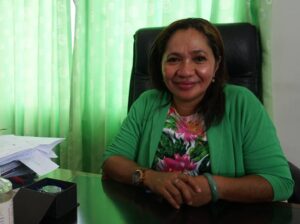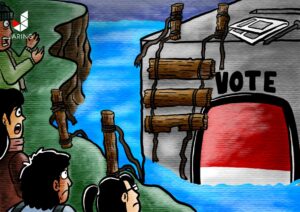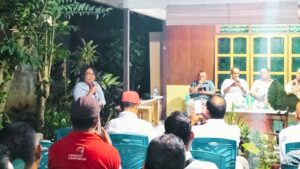Open data could encourage public to be more active in political participation. The founder of Sinar Project Malaysia, Khairil Yusof explained this does not only applied in the election process, but also in monitoring the performance of the elected politicians.
“One thing you could do, for instance, is when a politician submits a budget for building schools, you could check which electoral district he is trying to develop. Or you could see what exactly needs to be fixed in the area, under whose constituency region it is, to be able to acquire his responsibility,” said Khairil an online seminar – regional discussion – Election Open Data Landscape in Southeast Asia held by Asia-Pacific Regional Support for Election and Political Transition (RESPECT) Program, Wednesday, 16 July 2020.
In Malaysia, he said, the initiative to manage the election data was held by Sinar Project together with Bersih 2.0. The candidates’ data were connected with board of directors of state-owned company’s data. The result was, they found out that the winning or losing candidates often placed in the state-owned companies. Meanwhile, other organization like Tindak Malaysia, was collecting maps of electoral boundaries to monitor electoral engineering in electoral districts.
However, he admitted that data availability is still a problem in Malaysia. The absence of freedom of information act is hand in hand with various rules that forbid data publication. Consequently, people often have to spend some money to get data.
Standard
Khairil added, the open data needs to be supported by the open data standard availability, so that the civil society could develop the need to share data as well as to develop new initiative.
“It could be a problem if you have lots of data but not standardized. Those data could not be reused. If we have a standard, we could see which part needs to be repaired or lost,” he said.
The open data standardization, he continued, has been initiated by the civil organization in Myanmar. From that standard, they were able to create electoral educational product and encourage transparency.
Mahardika, the researcher of the Perkumpulan untuk Pemilu dan Demokrasi (Association for Election and Democracy/Perludem) said, the category and principle of the election’s open data were not fully implemented by the Indonesian election organizers. Referring to the National Democratic Institute (NDI), there are at least 16 important election’s data categories that need to be disclosed to the public.
For instance, election rules, constituency, electoral data, the amount of election’s organizers, procurement, budget, political parties, election result, election security and all things related to decision making process, need to be disclosed. Other than issuing categories, NDI also established the principles of open data such as periodically available, machine readable format, structured, detail, free, non-discriminative, available all time, and free to reuse. Those categories and principles should become the references to all election organizers.
“In Indonesia, the election data was collected through information system built by the election organizers. Almost all of the information system are not open to the public, only accessible to certain parties. For example, information system for voter registration could only be accessed by the election organizer. The voter could only check whether his name has been registered. “The information system for candidates could only be accessed by the candidate, not by the public,” said Mahardhika.
Another problem, the election data in Indonesia is still very scattered and there is no unique identifier to connect all data. Indonesian election data does not explain the variable, column and label used in files, and there is no information regarding behind the data processing available yet.
“Almost all essential data are available online, but not all data are compatible with open data principle,” he said.
According to Mahardhika, Indonesia needs to increase the open data standard generated participatively. Especially in election, the Komisi Pemilihan Umum (General Election Commission/KPU) needs to participate to develop the open data standard, adopt and implement it. The civilians also need to be systematically connected to utilize and disseminate the open data.
“The main goal of open data is to improve the election integrity and accountability through transparent election,” he concluded.
Titi Anggraini, the Executive Director of Perludem said, transparency and data disclosure are important not only to promote the election but also to invite the voters and the technology activists to participate. This would also support the election observers as well as the availability of the inclusive election information.
“In general, it is a bit difficult in Southeast Asia since there is no regulation to oversee the election data disclosure. Indonesia especially, does not have that,” said Titi.
According to Titi, it is important to have regional initiative to establish rules regarding election data disclosure. Not only data disclosure, data security and protection of voters’ personal data also need to be considered. Protecting voters’ data does not mean undisclosed all access to data, what needs to be done is agree on what is and is not allowed to be published.







